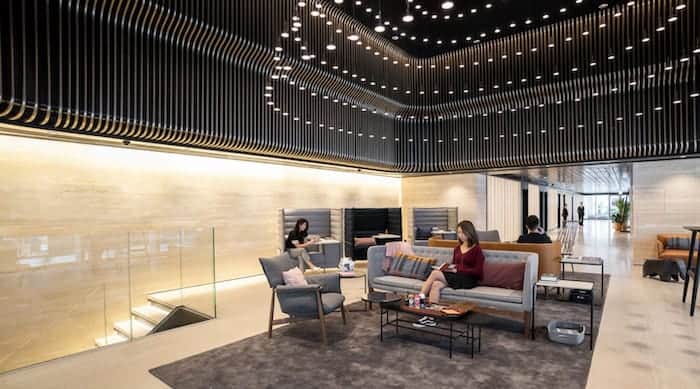
IWG’s Spaces location at Sun House in Sheung Wan
While WeWork’s IPO fiasco continues to shake the co-working universe, the world’s largest serviced office provider has announced that it has begun making available franchise opportunities under its Regus and Spaces brands in Hong Kong.
IWG, which started operating flexible workspaces in the 1990s and now has almost double the number of locations of its ill-starred rival, is looking to grow its network of 19 current locations in the Asian financial hub, using cluster franchising to expand into new areas.
The firm’s Hong Kong operations, which amount to 5 serviced offices under its co-working brand Spaces and 14 under its traditional serviced office identity Regus, recorded double-digit revenue growth in 2018, according to last year’s annual report.
The announcement follows the launch of the company’s franchise programme in Singapore last month and the sale of its Japan business for £320 million in April.
Selling Flexibility in the World’s Priciest Office Market
“Ultimately the goal of the franchise programme in Hong Kong is to build out our national network of locations in a city that has huge potential but which we’ve barely covered so far,” IWG’s vice president of development in Asia Pacific, Nigel Barnes, told Mingtiandi.
The Swiss-based company, which over the past five months has added five new Spaces locations to its portfolio in Asia’s wealthiest city, sees franchising as an easy way for investors to access the sector, according to Barnes.
The Hong Kong franchises, which will be sold in as-yet-unspecified geographic clusters, will give holders the right to develop in each location, leveraging IWG’s brand, infrastructure, and marketing sales platforms.

IWG’s Nigel Barnes said the shared office provider is looking for strong local partners
While declining to comment on the pricing of the franchises, Barnes confirmed that there would be financial incentives built into the growth agreements for each franchisee.
“We’re looking for strong partners who are locally active to support the growth of IWG’s business in Hong Kong, where there is huge potential for growth,” Barnes said.
The flexible sector represents only three percent of office space in the city, whereas up to 30 percent of corporate real estate globally within the next ten years is expected to be flexible space, which includes in-house hotdesking and other internal shared spaces as well as serviced offices, according to JLL.
Hong Kong leasing rates being the highest in the world makes IWG’s business case even more compelling, with the sector offering companies more flexibility and the opportunity of committing to shorter-term leases, Barnes told Mingtiandi.
The London-listed company’s score of locations in the city are among a network of 685 in Asia Pacific, with its business in the region recording revenue last year of £368 million, just over 16 percent of the company’s global total of £2.2 billion.
The company declined to provide specific financial data about Spaces or Regus operations in the city.
Following a Strategy That Supersized McDonalds
With the franchise programme already adopted successfully in the UK and Europe, Barnes said IWG are using the model as a way to activate areas not already covered by the company at a much faster rate than would otherwise be possible.
“In some respects, it’s not too different from the McDonald’s model of growth, where we’re offering a national network for customers that provides a known consistency and quality,” Barnes added.
In the UK and Europe, where IWG is also using its cluster approach to franchise sales, it has sold franchises to partners from a range of sectors, including conglomerates and smaller businesses, who see the opportunity as a way to diversify their offerings, according to Barnes.
“IWG’s franchise programme is an easy way for people to access an industry, in a very asset-light model, that is becoming more popular and relevant,” Barnes told Mingtiandi.
The IWG vice president added that the fallout of WeWork’s shelved initial public offering, reported just five days ago, is unlikely to reverse a growing trend of corporates embracing flexible workspace.
“In a much wider way core and flex is the lead model in corporate decision-making, with the advantages of fantastic economies of scale and the lack of heavy balance sheet implications making the flexible workspace very desirable,” Barnes said.
Japan and Taiwan Franchises Already Sold
The roll-out of the Hong Kong franchise comes as the company continues talks with potential franchise buyers in Singapore and five months after IWG sold a master franchise for its Japan business to Tokyo-based conference room provider TKP Corporation for £320 million.
That deal, unlike the cluster franchise model being proposed for Hong Kong, saw the London-listed firm sell off 100 percent of the equity in the company that operates its current locations in Japan, along with exclusive rights to use IWG’s Regus, Spaces and OpenOffice brands in the country.
Its 130 Japanese locations generated an EBITDA of £20.6 million last year.
In the same month that it revealed the Japanese deal, the firm sold a master franchise for its Taiwan business to the same conference room provider for £22.7 million, giving TKP Corporation exclusive rights to the use of the HQ, Regus and Spaces brands in Taiwan.
The country’s 14 flexible co-work centres in the country contributed £6.8 million to group revenue and generated EBITDA of £1.4 million in 2018.
Leave a Reply